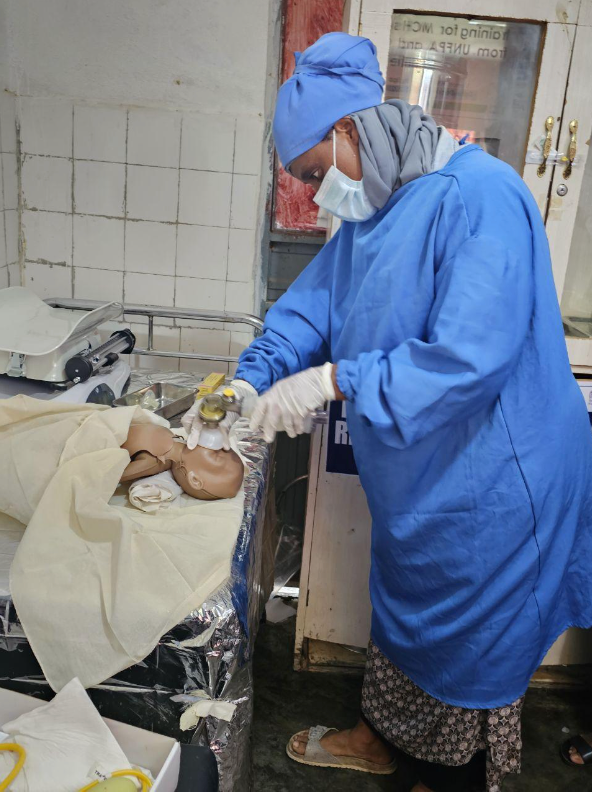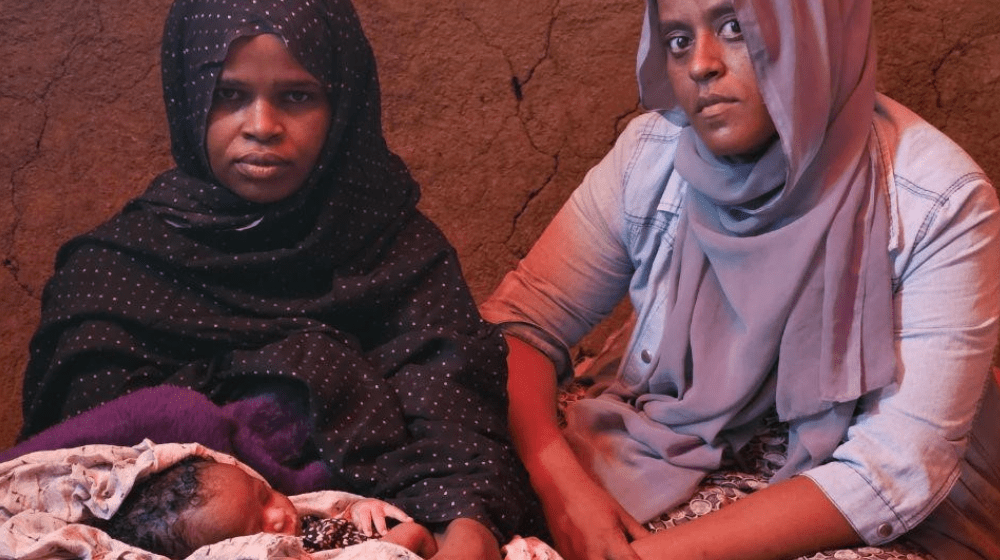DUDUCAMAD, Somali Region - “Saving the life of this baby was a miracle and a blessing for the family. I am immensely grateful with Salamawit for all her efforts to resuscitate my child”, says Amino Bashir, 25, with her baby, Farxan Hussein, in her arms at Duducamad, Erer zone, Somali Region.
Amino’s fourth pregnancy was like no other before. With a long history of stillbirths and intrauterine fetal deaths during unassisted deliveries at home, Amino went into labor for the first time assisted by a trained skilled birth attendant at Duducamad Health Center.
“The heartbeat of the baby was weak, with no crying. I immediately managed to cut the umbilical cord and begin the resuscitation process with a bag and basks”, says Selamawit Asnake, a mentored midwife assisting Amino at the health center.
Despite there was no instant response from the newborn, Selamawit continued to do resuscitation and monitor his vital signs. “After 15 minutes of many efforts, the baby began to breathe. His breathing condition was irregular so, I decided to call the ambulance and refer him to the Fik Hospital [around 40 kilometers away from the health center] for further treatment”, explains the midwife.
After three days at the Neonatal Intensive Care Unit, Farxan was stable, his respiratory rate was regular, and he was comfortably breastfeeding. His life was out of danger and ready to join his family.
The impact of health awareness and skilled birth deliveries on newborn care
Over 4.5 million women and babies die every year worldwide during pregnancy, childbirth or the first weeks after birth - equivalent to 1 death happening every 7 seconds - mostly from preventable or treatable causes if proper care was available. Prevention of maternal and newborn deaths is particularly challenging in developing countries.
“Unassisted home deliveries contribute to an increased risk of complications for the mother and her baby. These complications can cause death and lifelong disabilities. Most of these deaths and complications could have been prevented if the expectant mother were attended by a skilled birth attendant”, explains James Okara Wanyama, Doctor and currently, Humanitarian Programme Coordinator at UNFPA.
In Amino’s case, the intervention of community health volunteers from the Organization for Welfare and Development in Action (OWDA) providing maternal and newborn health education door-to-door to pregnant women and doing an early referral to a health facility for skilled delivery was key to avoid another stillbirth.
“Maternal health education plays a crucial role to overcome the barriers of access to reproductive health care, reduce home births conducted by traditional birth attendants, and improve increasing births in a health facility. This is particularly true in regions like Somali with still very low demand for skilled birth deliveries”, says Alemayehu Bogale, Sexual and Reproductive Health Analyst at UNFPA.

Improving maternal and newborn care
In 2023, UNFPA has deployed over 212 trained midwives to support maternal and newborn health care provision across 5 conflict and drought-affected regions, including Somali Region. In addition, 95 health extension workers and 6 Maternal Health Mobile Teams have been deployed to increase maternal and newborn health awareness and health seeking behavior among affected communities. To date, over 300,000 women and girls have benefited from reproductive health services, including maternal and newborn care.
As part of a joint project with UNICEF, and with funding from Ireland, UNFPA has supported the capacity building and mentorship of 69 health and protection professionals in the region on Emergency Obstetric and Newborn Care (EMoNC) and the Minimum Initial Service Package (MISP) for Sexual and Reproductive health, including Clinical Management of Rape, and GBV in emergencies. Medical equipment such as hospital beds and 136 IARH kits expected to benefit 190,650 emergency-affected populations with sexual and reproductive health services have also been provided to strengthen the health system capacity in the region. In addition, 5,000 dignity kits and equipment for health professionals on infection prevention and control as well as minor renovations in the water system of the Maternity and Newborn Care Ward were provided to ensure quality standards for maternal healthcare provision.
Similarly, pregnant women like Amino are being reached by women support groups and door-to-door health extension workers to increase the demand of skilled births at health facilities and prevent maternal and newborn deaths in the region.
Selamawit visited the family just a week after the baby was born. She is relieved that the baby is doing well, and the family is extremely happy. Her intervention, jointly with the community health volunteers, was decisive to save a Farxan’s life.
“The UNFPA Humanitarian Response Appeal 2023 is calling for nearly USD 45 million to respond to the protection and health needs of women and girls across crisis-affected regions in Ethiopia. Women like Amino need our support. To date, only 47% of the appeal has been received.


